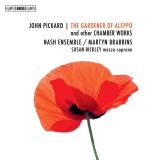 John Pickard: The Gardener of Aleppo für Flöte, Viola & Harfe + Daughters of Zion für Mezzosopran & Kammerensemble + Snowbound für Klarinette, Cello & Klavier + Serenata Concertata für Flöte & Kammerensemble + Three Chicken Studies für Oboe + The Phagotus of Afranio für Fagott & Klavier + Ghost-Train für Kammerensemble; The Nash Ensemble, Martyn Brabbins; 1 SACD BIS 2461; Aufnahme 09/2019, Veröffentlichung 05/2020 (79'22) - Rezension von Remy Franck
John Pickard: The Gardener of Aleppo für Flöte, Viola & Harfe + Daughters of Zion für Mezzosopran & Kammerensemble + Snowbound für Klarinette, Cello & Klavier + Serenata Concertata für Flöte & Kammerensemble + Three Chicken Studies für Oboe + The Phagotus of Afranio für Fagott & Klavier + Ghost-Train für Kammerensemble; The Nash Ensemble, Martyn Brabbins; 1 SACD BIS 2461; Aufnahme 09/2019, Veröffentlichung 05/2020 (79'22) - Rezension von Remy Franck
Nach früheren, von Pizzicato sehr gut bewerteten Veröffentlichungen von BIS mit Orchestermusik, stellt diese SACD den 1963 geborenen Briten John Pickard mit Werken vor, die variabel besetzt sind, von einer Solo-Oboe bis zu einem Kammerensemble von acht Spielern. Die sieben Werke entstanden im Zeitraum von etwas mehr als 30 Jahren.
Die beiden ersten Werke haben einen sehr ernsten Hintergrund: In The Gardener of Aleppo ist es der Krieg in Syrien und die Arbeit eines Gärtners, der mit seinen Blumen etwas Farbe in das Grauen des Alltags bringt, während ‘Daughters of Zion’ einen Text vertont, der antijüdische Aspekte bestimmter frühchristlicher Feste widerspiegelt.
Snowbound beschreibt die bedrückte Stimmung des Komponisten, als er einmal nach heftigen Schneefällen in seiner Wohnung eingesperrt war.
Die Serenata Concertata für Soloflöte und Ensemble, 1984 entstanden und das älteste Werk dieses Programms, ist ein spannungsvolles Stück in fünf sehr unterschiedlichen Sätzen.
Three Chicken Studies geht auf Beobachtungen des Komponisten zurück, der selbst Hühner gehalten hat, und The Phagotus of Afranio ist eine amüsante Parodie auf das Phagotus, ein Instrument, das um 1520 von Afranio of Ferrara erfunden wurde. Es war eine Art Dudelsack und nicht mit dem Fagott verwandt, obwohl es lange Zeit fälschlicherweise als Vorläufer des Fagotts bezeichnet wurde.
Das letzte Stück, Ghost Train, ist eine Art Perpetuum Mobile-Musik, die auf einem Cantus Firmus basiert, der dem Dies Irae-Thema entnommen ist. Es ist das beeindruckendste Werk des Programms, das jedoch insgesamt weniger nachhaltig ist als die Orchesterprogramme. Das liegt aber wohl eher an der Musik und nicht an den exzellenten Darbietungen des Nash Ensembles.
Following earlier and attractive BIS releases with orchestral music, this SACD presents the British composer John Pickard with works that are variably scored, from a solo oboe to a chamber ensemble of eight players. The seven works were written over a period of just over 30 years.
The first two works have a very serious background: In The Gardener of Aleppo it is the war in Syria and the work of a gardener who, with his flowers, brings some colour into the daily horror, while ‘Daughters of Zion’ sets a text that reflects anti-Jewish aspects of certain early Christian feasts.
Snowbound describes the composer’s depressed mood when he had to stay in his house after heavy snowfalls.
The Serenata Concertata for solo flute and ensemble, written in 1984 and thus the oldest work in this programme, is a smart piece in five very different movements.
Three Chicken Studies is based on observations by the composer, who himself kept chickens, and The Phagotus of Afranio is an amusing parody of the Phagotus, an instrument invented by Afranio of Ferrara around 1520. It was a kind of bagpipe and not related to the bassoon, although for a long time it was erroneously called the forerunner of the bassoon.
The final piece, Ghost Train, is a perpetuum mobile music based on a cantus firmus taken from the Dies Irae theme. It is the most impressive work in the programme, which is generally less attractive than the orchestral programmes. However, this is probably due to the music and not to the Nash Ensemble’s performances, which are excellent.






















